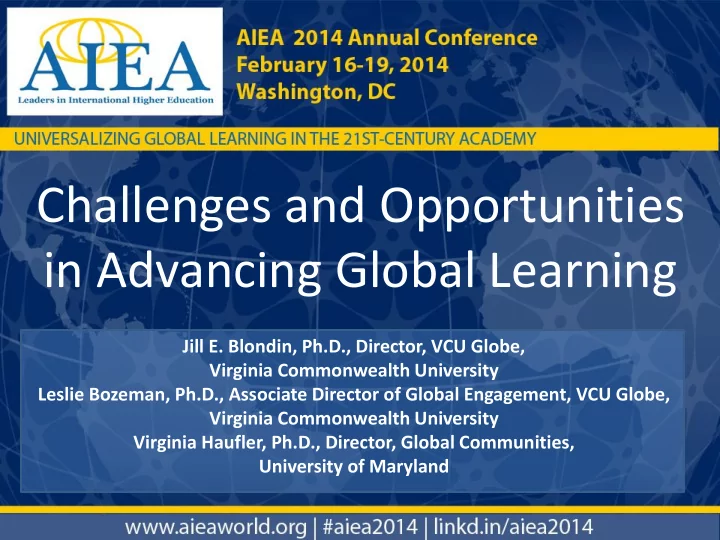

Challenges and Opportunities in Advancing Global Learning Jill E. Blondin, Ph.D., Director, VCU Globe, Virginia Commonwealth University Leslie Bozeman, Ph.D., Associate Director of Global Engagement, VCU Globe, Virginia Commonwealth University Virginia Haufler, Ph.D., Director, Global Communities, University of Maryland
Goals of Presentation • Share the components of successful global living-learning programs • Explain the collaborative effort involved in ensuring success • Evaluate the challenges that such programs face in implementation • Discuss how these models might be applied at other institutions
VCU Globe: A global education living-learning community • Success in any career in a 21 st -century global environment • Equips students to become culture brokers and to mediate across difference • Fosters intercultural learning through sustained engagement • Provides students with a conceptual grasp of and first-hand experience with the impact of globalization
VCU Globe: Program components • 12 hours of courses • General curriculum and disciplinary coursework • Experiential learning (education abroad, service- learning, on campus and off) • Co-curricular programs/professional development • 40 hours of engagement • Global education certificate
VCU Globe: Programmatic areas Global Engagement – Links to international students, faculty/staff, and visitors — on campus and internationally Community Outreach – Links to immigrants and refugee populations in Richmond area and internationally Co-Curricular Activities and Career Preparation – Residence hall programming
VCU Globe: Collaboration Development stage • Campus-wide task force • Global Education Office and Division of Student Affa irs During implementation • On-Campus • Partner with and learn from other campus units • Involve faculty from across campus (Faculty Fellows) • Capitalize on existing programming • Identify areas of need • Off-Campus • Work with Richmond-area partners and professionals
VCU Globe: Challenges Student-related • Competing commitments and opportunities • One-on-one engagement • Motivation and Personality Non-student-related • Changes in VCU tuition and fees • Campus awareness of new program • Development of sustainable assessment methods
UMD Global Communities • GC combines academic coursework, relevant programming and experiences, and participation in a residential community to help students: – understand globalization and global issues through scholarship and experience – develop the ability to work cooperatively with people of diverse backgrounds – prepare for life and work in an interconnected world
The Global Communities Program • Freshmen invitation two- year program in residence hall • 10 credit hours= transcript notation – 6 credits academic courses first year – 1 credit introductory course first semester – 3 credits global experience second year • Co-curricular program on campus, in Maryland, in Washington
The Need • Lack of globally oriented curriculum • Strategic Plan identified need • RFP for Global Minors and Global Learning Communities as part of larger effort • College of Behavioral and Social Sciences proposal for a living-learning program
The Plan • Restructure existing program • Collaboration among Provost, Undergraduate Studies, BSOS and Resident Life • Expanded and changed recruitment — freshmen invitation, 75 per year • Strengthened/ changed academics — interdisciplinary, rooted in social sciences • Added “Global Experience” requirement • Appointed academic director • Provided more resources
Implementation Challenges 2011-2014 • Develop required academic courses and get them approved for General Education • Develop global experience alternatives and the courses to go with them • Develop recruitment process and marketing • Switch from capstone to preparatory course • Develop co-curricular programming • Hire appropriate staff • Work with College of BSOS and University
Future Challenges • Recruitment – International students – Gender balance – Competing programs on campus • Global experience – Funds to send students abroad – Developing new service-learning options • Resources – Staffing and retention – Flat budget • Strengthening links to other programs on campus
Discussion/Q & A 1. What are the costs and benefits of implementing these types of global learning models on your campus?
Discussion/Q & A 2. What challenges and opportunities present themselves on your campus in implementing global learning activities?
Discussion/Q & A 3. What other global learning models are being considered through your campus’ internationalization efforts?
Contact Information • Jill E. Blondin, Ph.D., Director, VCU Globe – jblondin@vcu.edu; (804) 828-9608 • Leslie Bozeman, Ph.D., Associate Director of Global Engagement, VCU Globe – labozeman@vcu.edu; (804) 827-0178 • Virginia Haufler, Ph.D., Director, Global Communities – vhaufler@umd.edu; (301) 405-4122
Recommend
More recommend